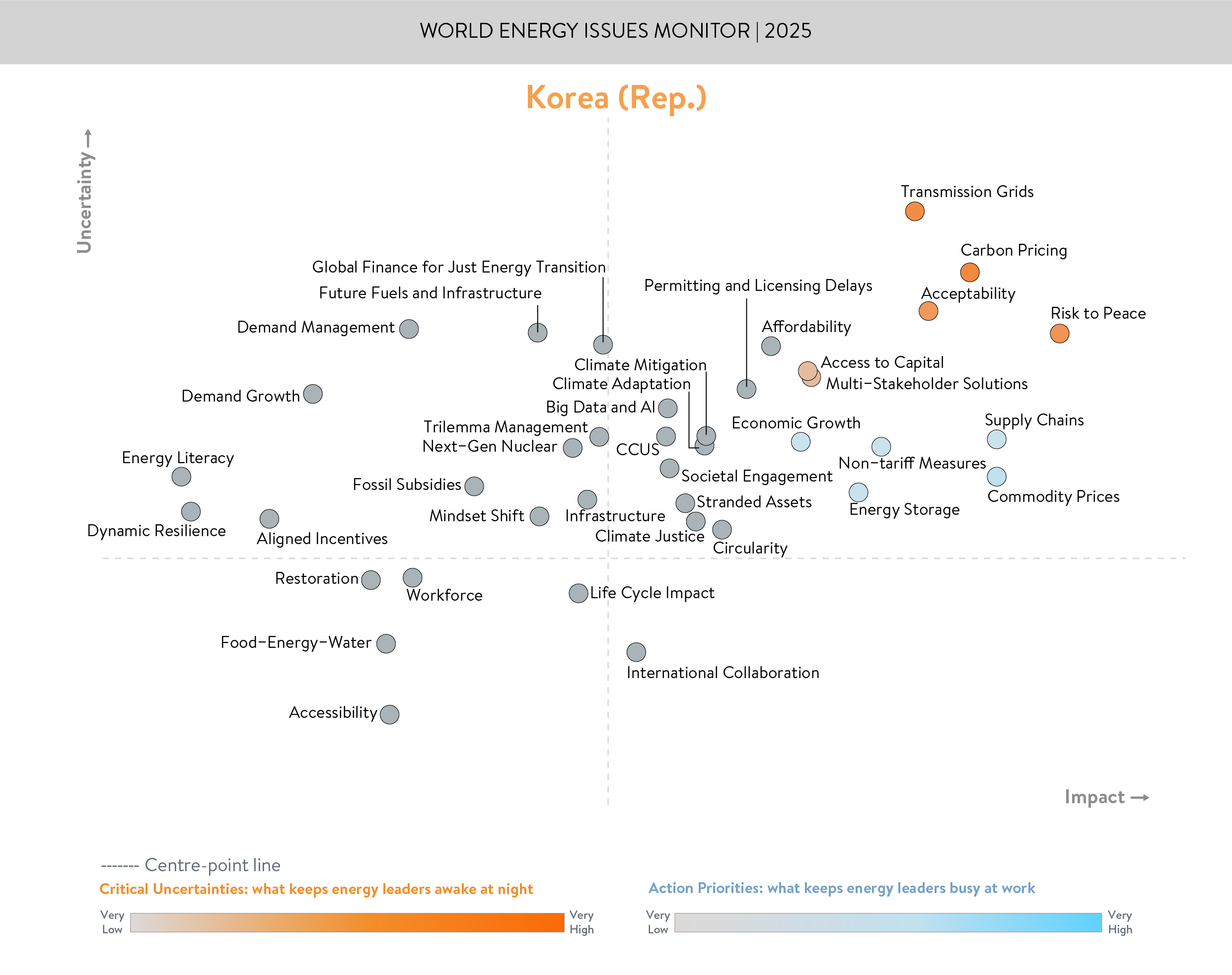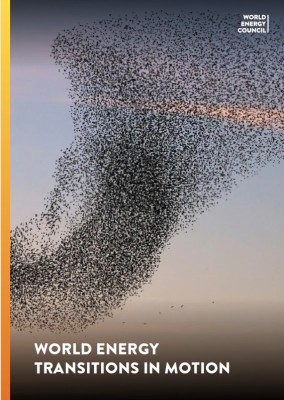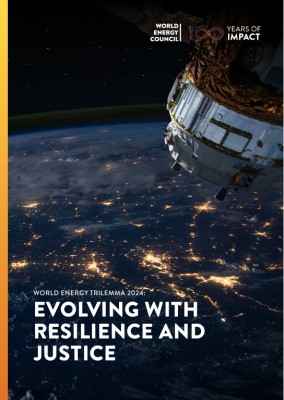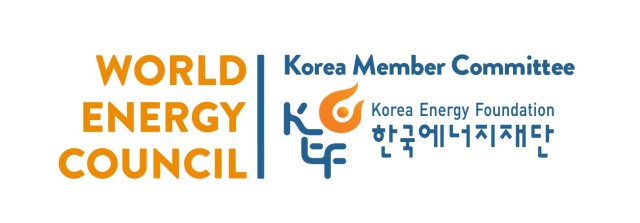The Republic of Korea National Committee aims to promote sustainable energy development in Korea (Rep.), as a part of the WEC’s energy vision. As a member of the WEC network, the organisation is committed to representing the Republic of Korea's perspective within national, regional and global energy debates. The committee includes a variety of members to ensure that the diverse energy interests of the Republic of Korea are appropriately represented. Members of the committee are invited to attend high-level events, participate in energy-focused study groups, contribute to technical research and be a part of the global energy dialogue.
Mr. Young-Nam Ju obtained a Masters of NGO Studies in 2013 from Kyunghee University. Mr Ju has taken up many roles in the energy industry including more recently, serving as Secretary General of the Korea Energy Foundation. Mr Ju also has experience working for the Prime Minister's office and was CO-CEO of the Open Society Citizens' Alliance.
ENERGY IN KOREA (REP.)

INTRODUCTION
South Korea's recent energy landscape has faced significant challenges. In particular, the COVID-19 pandemic and the war in Ukraine have had a profound impact on the nation's energy policy and market.
Firstly, the war in Ukraine triggered a sharp rise in global commodity prices, significantly increasing the cost of energy imports such as LNG. As South Korea relies on imports for over 90% of its energy sources, the country has been particularly vulnerable to these international price hikes.
Moreover, the instability in global supply chains caused by COVID-19 and the war in Ukraine intensified the competition for key minerals such as lithium, nickel, and cobalt - essential materials for batteries and solar panels. These vulnerabilities were highlighted in the World Energy Trilemma Report, which ranked South Korea as having one of the weakest standings in energy security.
Additionally, South Korea's total energy demand is projected to grow from 286.8 million toe in 2023 to 307.5 million toe by 2050, further exacerbating these challenges.
To address these issues, South Korea has taken several steps:
- The government has made efforts to expand renewable energy sources such as solar and wind power to achieve its 2050 net-zero emissions goal. However, these initiatives have yielded limited progress so far, mainly due to concerns over power supply stability and cost-effectiveness.
- As part of its national policy, South Korea is also expanding its nuclear energy capabilities. The completion of Shin Hanul Units 1(2022) and 2(2024), along with the initiation of Units 3 and 4, marks a strategic shift toward increased nuclear power generation. As a result, while energy supplied from oil and coal is decreasing, the share of natural gas (16.7%) and nuclear power (17.0%) is gradually increasing.
- To reduce its dependence on Russian LNG, South Korea has diversified its supply sources, actively securing LNG from countries such as the United States and Australia to bolster energy security.
ENERGY ISSUES IN MOTION
South Korea’s previous Energy Issues Monitor report was published in 2022. Since then, several energy issues included in the survey have undergone improvements, been revised, or newly added. While these adjustments reduce the number of issues that can be directly compared, it is worth noting that while many issues were classified as Critical Uncertainties in the previous assessment, this year’s results show that most of these have been reclassified as Watch Issues, with a reduced level of uncertainty attributed to them.
In particular, two key issues - Commodity Prices and Economic Growth - were categorized as Critical Uncertainties in 2022 due to the impact of COVID-19. Since then, the uncertainty surrounding these issues has significantly decreased. Nevertheless, they remain recognized as Action Priorities, indicating their continued importance.
In this year’s survey, Transmision Grids and Carbon Pricing emerged as the most uncertain issues. South Korea has a well-established infrastructure capable of supplying electricity to virtually all households and businesses. Compared to countries with large land areas or developing economies that often face transmission grid deficiencies, South Korea’s grid system is considered highly developed. However, aging infrastructure and surging electricity demand in densely populated urban areas sometimes outpace the system’s capacity. To address this, it is necessary to replace outdated systems, adopt intelligent smart grid technologies, and enhance the overall efficiency and balance between electricity supply and demand.
Secondly, while carbon pricing has been introduced in South Korea, it has yet to function effectively as a full-fledged market mechanism. Given that over half of the country’s energy supply still depends on oil (36.5%) and coal (23.9%), carbon pricing may pose a significant financial burden on energy-intensive industries. To mitigate this, the government should consider providing financial support, investing in technology development, and expanding incentives for industries that are likely to be heavily affected by carbon pricing policies.
FROM BLIND SPOTS TO BRIGHT SPOTS
One of the key blind spots in South Korea’s energy landscape is energy literacy. While the general level of energy literacy among South Korean citizens is considered high, due to the country’s heavy reliance on energy imports and the significant price fluctuations influenced by global conditions, the public tends to feel the impact of immediate energy costs more acutely, and attribute a higher importance to this issues than to long-term energy transition or future sustainability objectives. This tendency is closely linked to NIMBY (Not In My Backyard) behavior, which often hinders the timely implementation of energy infrastructure projects, such as power plants or small modular reactors (SMRs). In some cases, public resistance has even led to the cancellation of such initiatives.
This complex issue cannot be resolved in the short term. However, a potential path forward lies in gradually building public consensus by introducing international examples of energy transition and offering community-level incentives, which can help foster understanding and acceptance over time.
On the Bright Spot perspective, South Korea also has numerous strengths. The country possesses world-class infrastructure and technology for electric vehicles (EVs) and is actively implementing policies aimed at improving energy efficiency in residential and industrial buildings. In particular, Busan Metropolitan City and Sejong Special Autonomous City have been designated as pilot smart cities, where cutting-edge technologies are being used to create energy-efficient urban models. By sharing the outcomes of these initiatives, South Korea could offer valuable benchmarks for other countries pursuing similar goals.
ADDRESSING CORE UNCERTAINTIES IN THE WORLD ENERGY TRILEMMA
South Korea’s Energy Trilemma Index reflects a mixed performance. While the country ranks among the highest globally in Energy Equity, it still shows significant room for improvement in Environmental Sustainability and Energy Security, and these areas have not shown consistent progress over time.
This vulnerability is perhaps inevitable in a country that imports over 90% of its energy resources and where more than 50% of energy production still relies on oil and coal. In theory, the path to improvement seems clear: diversifying energy import sources and expanding the adoption of clean and renewable energy. However, the implementation and effectiveness of these solutions are far from simple.
The South Korean government is actively pursuing various strategies to address these challenges. Among them, the expansion of nuclear power stands out as a significant effort, which is already showing tangible results in strengthening the country's energy stability and sustainability.
Unfortunately, the results of these efforts do not manifest in the short term. To accelerate progress and bring about meaningful change, a long-term perspective must be paired with effective public communication and engagement.
Acknowledgements
Korea Member Committee
JunYoung Yang
Downloads

Korea (Rep. of) World Energy Issues Monitor 2025 Country Commentary
Download PDF







